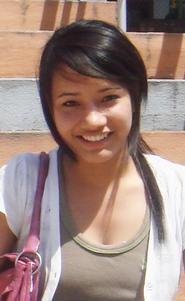
In Nepal, medicine and traditional practices are in a constant tug-of-war for the trust of the population. Although the Nepali medical sector is growing and professions in this field are among the most sought-after in the country, a large segment of the population that uses medical services only needs one failed surgery to resort to traditional healing practices. This summer, Akritee Shrestha ’13 is immersing herself in the growing medical field in Nepal through an internship at the prestigious Nepal Health Research Council (NHRC). She received a Jeffrey Fund for Science Internship, which supports full-time, off-campus internships related to science.
“Science here is eager to win people over and maintain their trust,” Shrestha said. “I feel that to make medical and scientific interventions more effective for that purpose, communication among professionals is crucial. And this is where organizations like the NHRC come in.” As the curators of national and international medical research in Nepal since 1991, the NHRC serves to improve Nepal’s quality and quantity of scientific research. The NHRC funds research, hosts national and international conferences, authorizes potential research to be eligible for national funding, and publishes a medical journal that shares all of the latest research within the scientific community. It includes review articles, case studies and viewpoints, along with the typical scientific studies that have been approved by the NHRC’s own ethical review board, ranging from traditional medicine to surgical procedures.
Concerned about the state of medical research in her native country, Shrestha submitted a proposal for an internship position to the NHRC, in effect creating her own position. She works closely with the executive editor and editorial assistant on editing manuscripts that could go into the journal. She also helps plan events and workshops that the NHRC offers for research professionals. But Shrestha had her own reasons for wanting to work with the NHRC: “My internship is mostly for the purpose of letting me build up my knowledge of the health system and current situation in Nepal,” she said.
To Shrestha, the NHRC fills a vital hole in the world of science in Nepal. “When I started my internship search in Nepal, I couldn't find many opportunities in scientific research. I felt that there was either not much going on or there was a significant communication gap. When I found out about NHRC, I noticed that there was actually a lot happening in Nepal and NHRC was trying to bridge that gap between people who are interested in scientific research and development and those that already involved in it, as well as among the members of the scientific community,” Shrestha said. By familiarizing herself with the process as well as the material of the Nepali health sector, she finds that she is more prepared to navigate the difficulties involved in her desired career of health care professional. Editing so many journals has also improved her writing skills, which Shrestha knows will help her in her future science courses at Hamilton as well as in her career.
Shrestha graduated from St. Xavier’s College in Kathmandu, Nepal.
“Science here is eager to win people over and maintain their trust,” Shrestha said. “I feel that to make medical and scientific interventions more effective for that purpose, communication among professionals is crucial. And this is where organizations like the NHRC come in.” As the curators of national and international medical research in Nepal since 1991, the NHRC serves to improve Nepal’s quality and quantity of scientific research. The NHRC funds research, hosts national and international conferences, authorizes potential research to be eligible for national funding, and publishes a medical journal that shares all of the latest research within the scientific community. It includes review articles, case studies and viewpoints, along with the typical scientific studies that have been approved by the NHRC’s own ethical review board, ranging from traditional medicine to surgical procedures.
Concerned about the state of medical research in her native country, Shrestha submitted a proposal for an internship position to the NHRC, in effect creating her own position. She works closely with the executive editor and editorial assistant on editing manuscripts that could go into the journal. She also helps plan events and workshops that the NHRC offers for research professionals. But Shrestha had her own reasons for wanting to work with the NHRC: “My internship is mostly for the purpose of letting me build up my knowledge of the health system and current situation in Nepal,” she said.
To Shrestha, the NHRC fills a vital hole in the world of science in Nepal. “When I started my internship search in Nepal, I couldn't find many opportunities in scientific research. I felt that there was either not much going on or there was a significant communication gap. When I found out about NHRC, I noticed that there was actually a lot happening in Nepal and NHRC was trying to bridge that gap between people who are interested in scientific research and development and those that already involved in it, as well as among the members of the scientific community,” Shrestha said. By familiarizing herself with the process as well as the material of the Nepali health sector, she finds that she is more prepared to navigate the difficulties involved in her desired career of health care professional. Editing so many journals has also improved her writing skills, which Shrestha knows will help her in her future science courses at Hamilton as well as in her career.
Shrestha graduated from St. Xavier’s College in Kathmandu, Nepal.
Posted July 2, 2010
